LAW Media Communication ACC717: Copyright Infringement Cases Analysis
VerifiedAdded on 2020/03/16
|12
|3127
|291
Essay
AI Summary
This essay provides a detailed comparative analysis of two significant copyright infringement cases in media law: Men at Work's 'Down Under' and Taylor Swift's 'Shake it Off'. The essay begins with an introduction to media law, focusing on copyright issues concerning intellectual property rights in the music industry. It then outlines the facts and legal proceedings of each case, highlighting the key disputes, rulings, and outcomes. The 'Down Under' case involves allegations of copyright infringement related to the song 'Kookaburra', while the 'Shake it Off' case centers on claims of lyrical similarity. A comparison and contrast section follows, examining the similarities and differences between the two cases, particularly concerning originality, legal precedents, and audience perception. The essay concludes by emphasizing the importance of copyright laws in the music industry, the evolution of copyright claims, and the impact of legal decisions on professional practice. The analysis underscores the legal requirements for proving copyright infringement, differentiating between original work and the use of common phrases, and the relevance of national copyright laws.
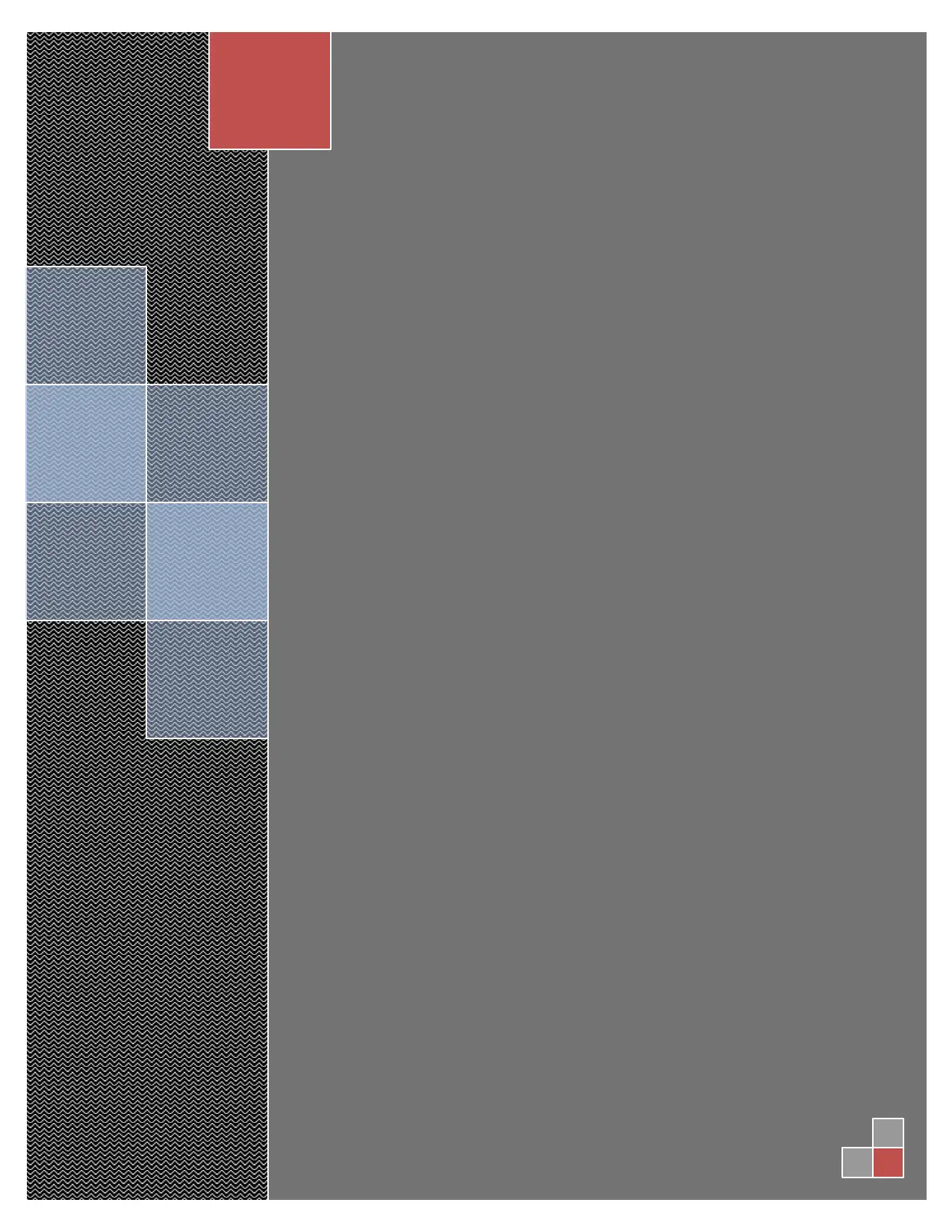
Paraphrase This Document
Need a fresh take? Get an instant paraphrase of this document with our AI Paraphraser
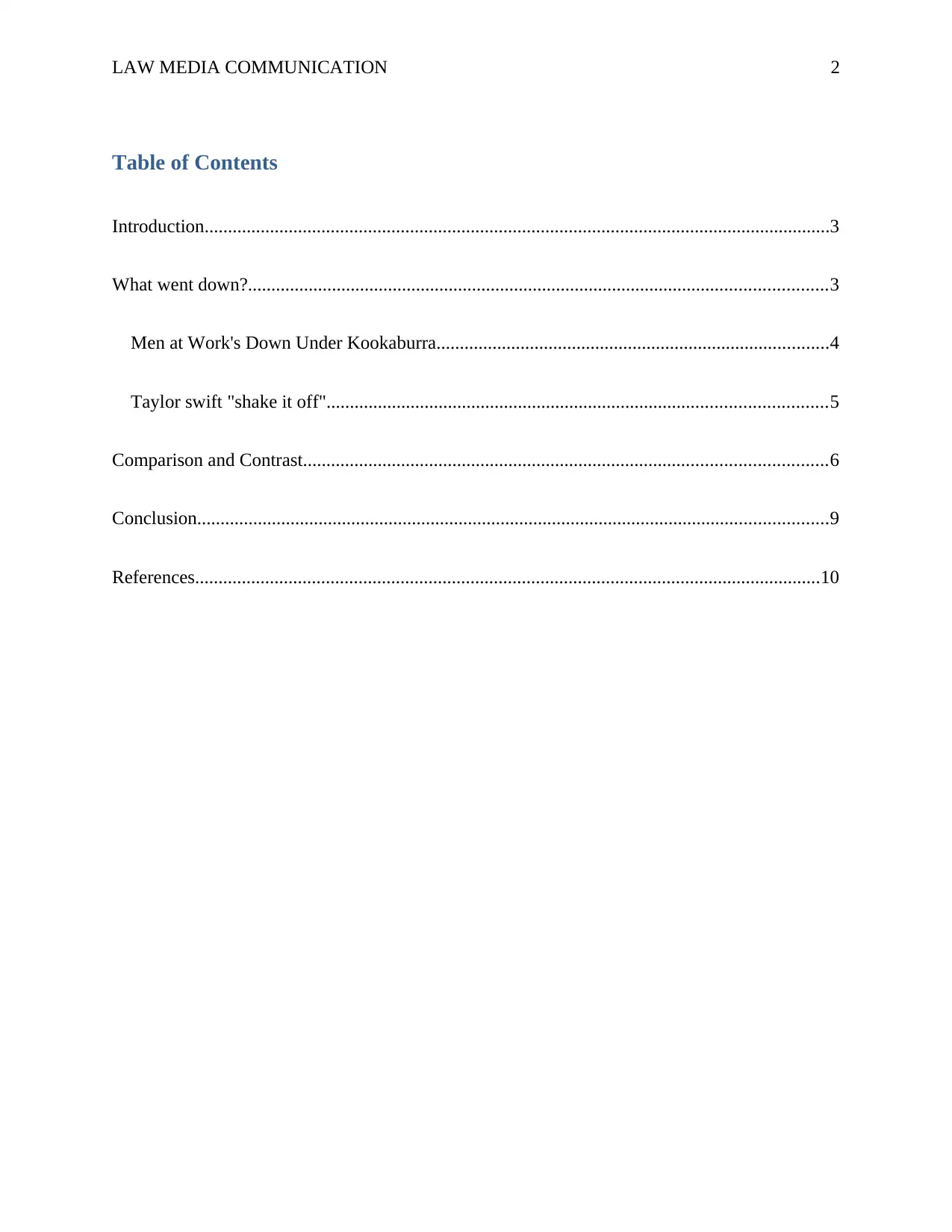
LAW MEDIA COMMUNICATION 2
Table of Contents
Introduction......................................................................................................................................3
What went down?............................................................................................................................3
Men at Work's Down Under Kookaburra....................................................................................4
Taylor swift "shake it off"...........................................................................................................5
Comparison and Contrast................................................................................................................6
Conclusion.......................................................................................................................................9
References......................................................................................................................................10
Table of Contents
Introduction......................................................................................................................................3
What went down?............................................................................................................................3
Men at Work's Down Under Kookaburra....................................................................................4
Taylor swift "shake it off"...........................................................................................................5
Comparison and Contrast................................................................................................................6
Conclusion.......................................................................................................................................9
References......................................................................................................................................10
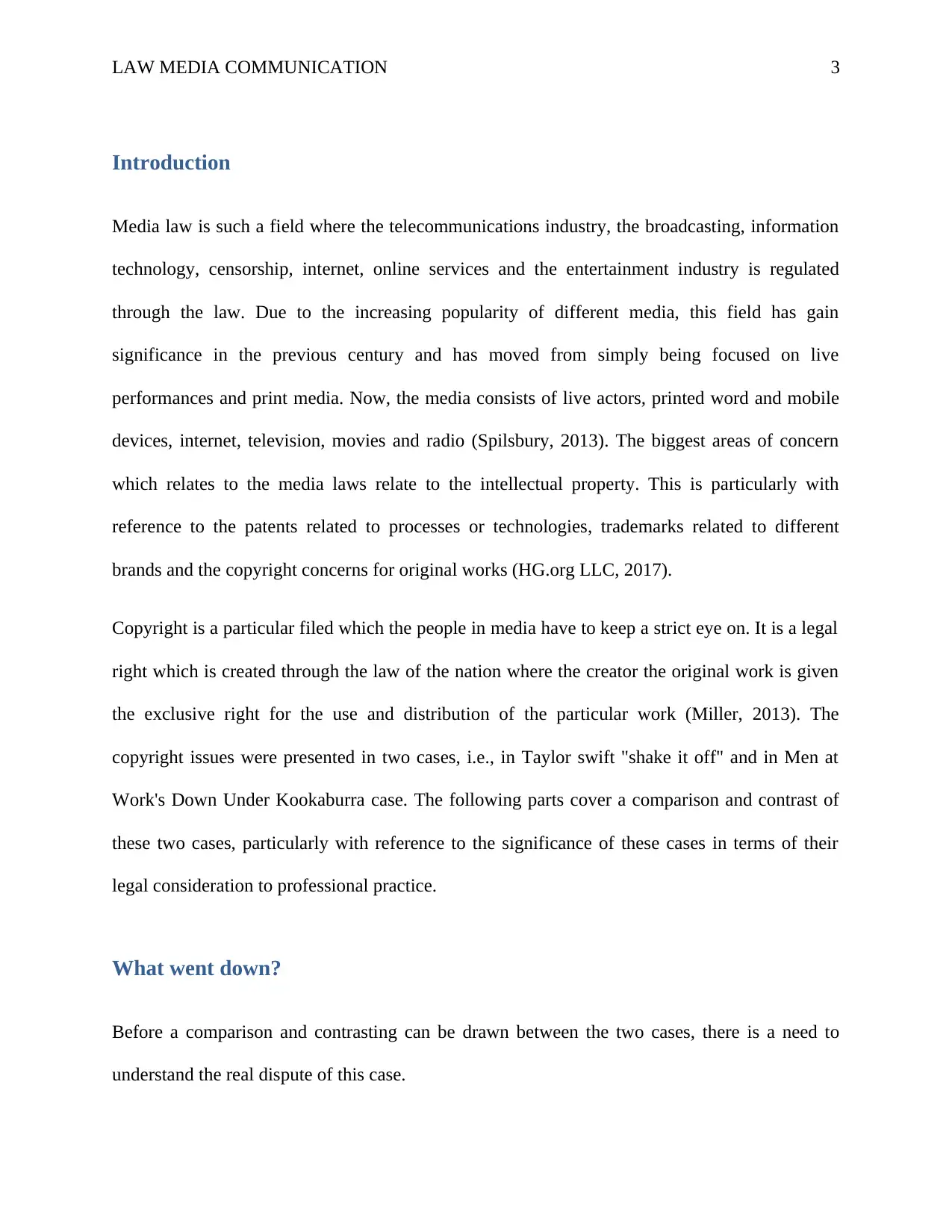
LAW MEDIA COMMUNICATION 3
Introduction
Media law is such a field where the telecommunications industry, the broadcasting, information
technology, censorship, internet, online services and the entertainment industry is regulated
through the law. Due to the increasing popularity of different media, this field has gain
significance in the previous century and has moved from simply being focused on live
performances and print media. Now, the media consists of live actors, printed word and mobile
devices, internet, television, movies and radio (Spilsbury, 2013). The biggest areas of concern
which relates to the media laws relate to the intellectual property. This is particularly with
reference to the patents related to processes or technologies, trademarks related to different
brands and the copyright concerns for original works (HG.org LLC, 2017).
Copyright is a particular filed which the people in media have to keep a strict eye on. It is a legal
right which is created through the law of the nation where the creator the original work is given
the exclusive right for the use and distribution of the particular work (Miller, 2013). The
copyright issues were presented in two cases, i.e., in Taylor swift "shake it off" and in Men at
Work's Down Under Kookaburra case. The following parts cover a comparison and contrast of
these two cases, particularly with reference to the significance of these cases in terms of their
legal consideration to professional practice.
What went down?
Before a comparison and contrasting can be drawn between the two cases, there is a need to
understand the real dispute of this case.
Introduction
Media law is such a field where the telecommunications industry, the broadcasting, information
technology, censorship, internet, online services and the entertainment industry is regulated
through the law. Due to the increasing popularity of different media, this field has gain
significance in the previous century and has moved from simply being focused on live
performances and print media. Now, the media consists of live actors, printed word and mobile
devices, internet, television, movies and radio (Spilsbury, 2013). The biggest areas of concern
which relates to the media laws relate to the intellectual property. This is particularly with
reference to the patents related to processes or technologies, trademarks related to different
brands and the copyright concerns for original works (HG.org LLC, 2017).
Copyright is a particular filed which the people in media have to keep a strict eye on. It is a legal
right which is created through the law of the nation where the creator the original work is given
the exclusive right for the use and distribution of the particular work (Miller, 2013). The
copyright issues were presented in two cases, i.e., in Taylor swift "shake it off" and in Men at
Work's Down Under Kookaburra case. The following parts cover a comparison and contrast of
these two cases, particularly with reference to the significance of these cases in terms of their
legal consideration to professional practice.
What went down?
Before a comparison and contrasting can be drawn between the two cases, there is a need to
understand the real dispute of this case.
⊘ This is a preview!⊘
Do you want full access?
Subscribe today to unlock all pages.

Trusted by 1+ million students worldwide
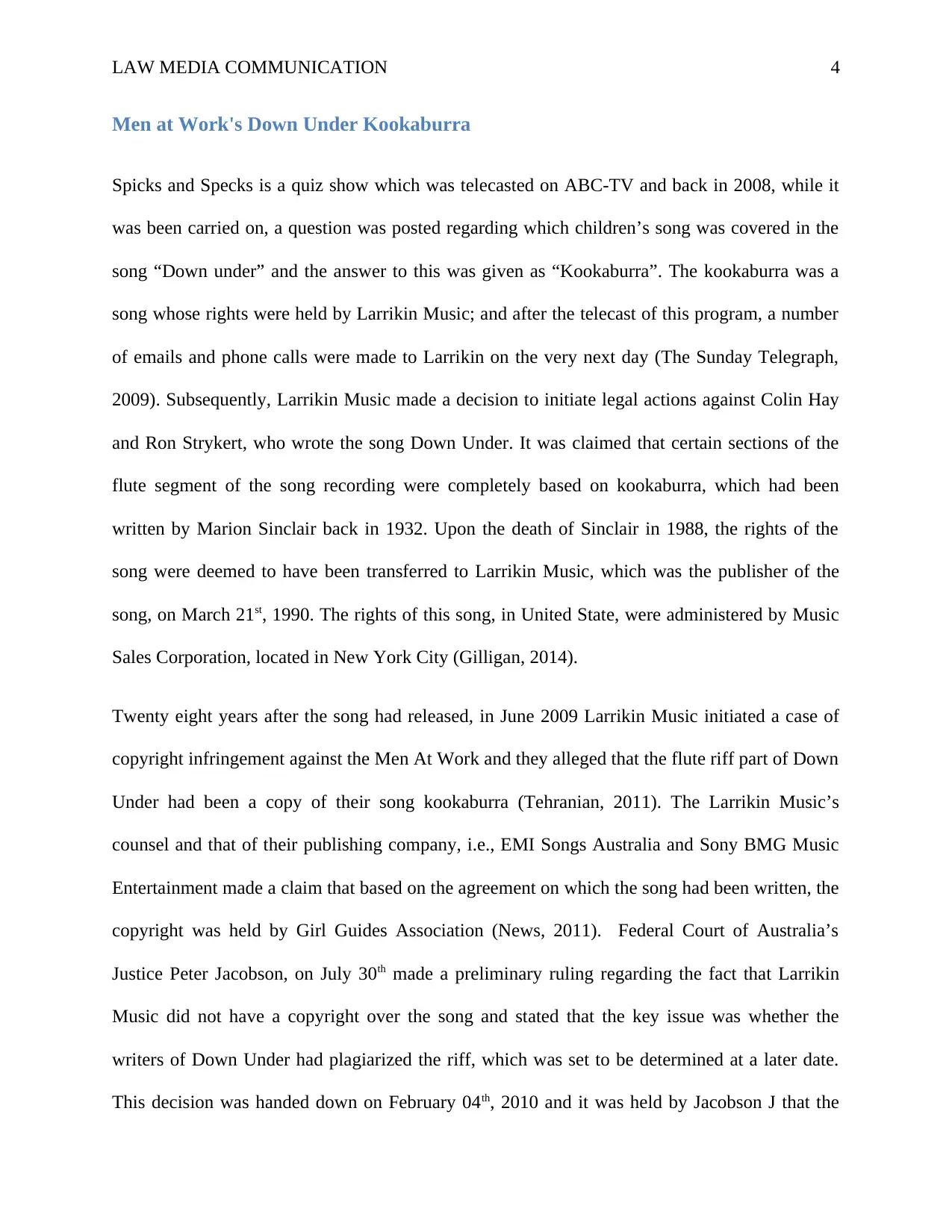
LAW MEDIA COMMUNICATION 4
Men at Work's Down Under Kookaburra
Spicks and Specks is a quiz show which was telecasted on ABC-TV and back in 2008, while it
was been carried on, a question was posted regarding which children’s song was covered in the
song “Down under” and the answer to this was given as “Kookaburra”. The kookaburra was a
song whose rights were held by Larrikin Music; and after the telecast of this program, a number
of emails and phone calls were made to Larrikin on the very next day (The Sunday Telegraph,
2009). Subsequently, Larrikin Music made a decision to initiate legal actions against Colin Hay
and Ron Strykert, who wrote the song Down Under. It was claimed that certain sections of the
flute segment of the song recording were completely based on kookaburra, which had been
written by Marion Sinclair back in 1932. Upon the death of Sinclair in 1988, the rights of the
song were deemed to have been transferred to Larrikin Music, which was the publisher of the
song, on March 21st, 1990. The rights of this song, in United State, were administered by Music
Sales Corporation, located in New York City (Gilligan, 2014).
Twenty eight years after the song had released, in June 2009 Larrikin Music initiated a case of
copyright infringement against the Men At Work and they alleged that the flute riff part of Down
Under had been a copy of their song kookaburra (Tehranian, 2011). The Larrikin Music’s
counsel and that of their publishing company, i.e., EMI Songs Australia and Sony BMG Music
Entertainment made a claim that based on the agreement on which the song had been written, the
copyright was held by Girl Guides Association (News, 2011). Federal Court of Australia’s
Justice Peter Jacobson, on July 30th made a preliminary ruling regarding the fact that Larrikin
Music did not have a copyright over the song and stated that the key issue was whether the
writers of Down Under had plagiarized the riff, which was set to be determined at a later date.
This decision was handed down on February 04th, 2010 and it was held by Jacobson J that the
Men at Work's Down Under Kookaburra
Spicks and Specks is a quiz show which was telecasted on ABC-TV and back in 2008, while it
was been carried on, a question was posted regarding which children’s song was covered in the
song “Down under” and the answer to this was given as “Kookaburra”. The kookaburra was a
song whose rights were held by Larrikin Music; and after the telecast of this program, a number
of emails and phone calls were made to Larrikin on the very next day (The Sunday Telegraph,
2009). Subsequently, Larrikin Music made a decision to initiate legal actions against Colin Hay
and Ron Strykert, who wrote the song Down Under. It was claimed that certain sections of the
flute segment of the song recording were completely based on kookaburra, which had been
written by Marion Sinclair back in 1932. Upon the death of Sinclair in 1988, the rights of the
song were deemed to have been transferred to Larrikin Music, which was the publisher of the
song, on March 21st, 1990. The rights of this song, in United State, were administered by Music
Sales Corporation, located in New York City (Gilligan, 2014).
Twenty eight years after the song had released, in June 2009 Larrikin Music initiated a case of
copyright infringement against the Men At Work and they alleged that the flute riff part of Down
Under had been a copy of their song kookaburra (Tehranian, 2011). The Larrikin Music’s
counsel and that of their publishing company, i.e., EMI Songs Australia and Sony BMG Music
Entertainment made a claim that based on the agreement on which the song had been written, the
copyright was held by Girl Guides Association (News, 2011). Federal Court of Australia’s
Justice Peter Jacobson, on July 30th made a preliminary ruling regarding the fact that Larrikin
Music did not have a copyright over the song and stated that the key issue was whether the
writers of Down Under had plagiarized the riff, which was set to be determined at a later date.
This decision was handed down on February 04th, 2010 and it was held by Jacobson J that the
Paraphrase This Document
Need a fresh take? Get an instant paraphrase of this document with our AI Paraphraser
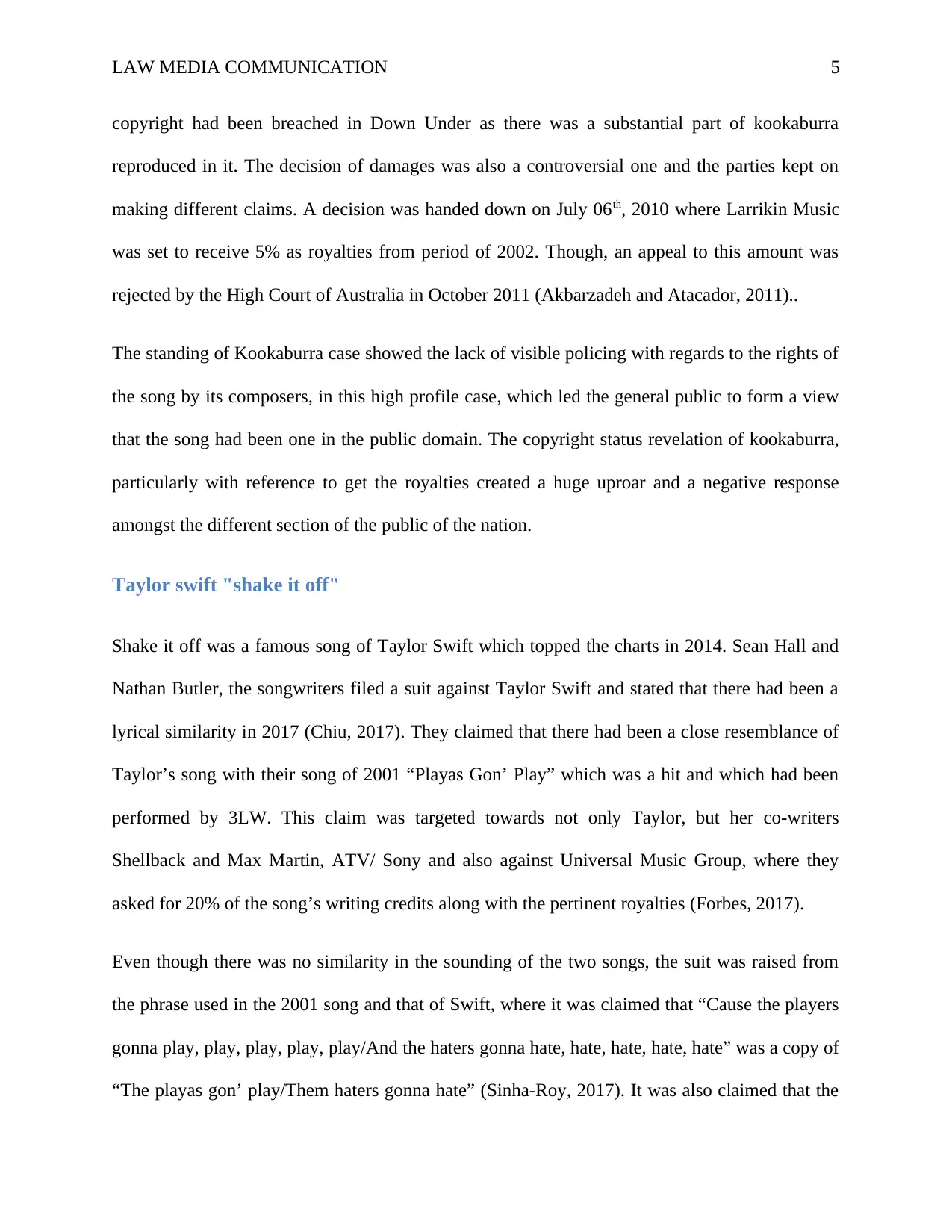
LAW MEDIA COMMUNICATION 5
copyright had been breached in Down Under as there was a substantial part of kookaburra
reproduced in it. The decision of damages was also a controversial one and the parties kept on
making different claims. A decision was handed down on July 06th, 2010 where Larrikin Music
was set to receive 5% as royalties from period of 2002. Though, an appeal to this amount was
rejected by the High Court of Australia in October 2011 (Akbarzadeh and Atacador, 2011)..
The standing of Kookaburra case showed the lack of visible policing with regards to the rights of
the song by its composers, in this high profile case, which led the general public to form a view
that the song had been one in the public domain. The copyright status revelation of kookaburra,
particularly with reference to get the royalties created a huge uproar and a negative response
amongst the different section of the public of the nation.
Taylor swift "shake it off"
Shake it off was a famous song of Taylor Swift which topped the charts in 2014. Sean Hall and
Nathan Butler, the songwriters filed a suit against Taylor Swift and stated that there had been a
lyrical similarity in 2017 (Chiu, 2017). They claimed that there had been a close resemblance of
Taylor’s song with their song of 2001 “Playas Gon’ Play” which was a hit and which had been
performed by 3LW. This claim was targeted towards not only Taylor, but her co-writers
Shellback and Max Martin, ATV/ Sony and also against Universal Music Group, where they
asked for 20% of the song’s writing credits along with the pertinent royalties (Forbes, 2017).
Even though there was no similarity in the sounding of the two songs, the suit was raised from
the phrase used in the 2001 song and that of Swift, where it was claimed that “Cause the players
gonna play, play, play, play, play/And the haters gonna hate, hate, hate, hate, hate” was a copy of
“The playas gon’ play/Them haters gonna hate” (Sinha-Roy, 2017). It was also claimed that the
copyright had been breached in Down Under as there was a substantial part of kookaburra
reproduced in it. The decision of damages was also a controversial one and the parties kept on
making different claims. A decision was handed down on July 06th, 2010 where Larrikin Music
was set to receive 5% as royalties from period of 2002. Though, an appeal to this amount was
rejected by the High Court of Australia in October 2011 (Akbarzadeh and Atacador, 2011)..
The standing of Kookaburra case showed the lack of visible policing with regards to the rights of
the song by its composers, in this high profile case, which led the general public to form a view
that the song had been one in the public domain. The copyright status revelation of kookaburra,
particularly with reference to get the royalties created a huge uproar and a negative response
amongst the different section of the public of the nation.
Taylor swift "shake it off"
Shake it off was a famous song of Taylor Swift which topped the charts in 2014. Sean Hall and
Nathan Butler, the songwriters filed a suit against Taylor Swift and stated that there had been a
lyrical similarity in 2017 (Chiu, 2017). They claimed that there had been a close resemblance of
Taylor’s song with their song of 2001 “Playas Gon’ Play” which was a hit and which had been
performed by 3LW. This claim was targeted towards not only Taylor, but her co-writers
Shellback and Max Martin, ATV/ Sony and also against Universal Music Group, where they
asked for 20% of the song’s writing credits along with the pertinent royalties (Forbes, 2017).
Even though there was no similarity in the sounding of the two songs, the suit was raised from
the phrase used in the 2001 song and that of Swift, where it was claimed that “Cause the players
gonna play, play, play, play, play/And the haters gonna hate, hate, hate, hate, hate” was a copy of
“The playas gon’ play/Them haters gonna hate” (Sinha-Roy, 2017). It was also claimed that the
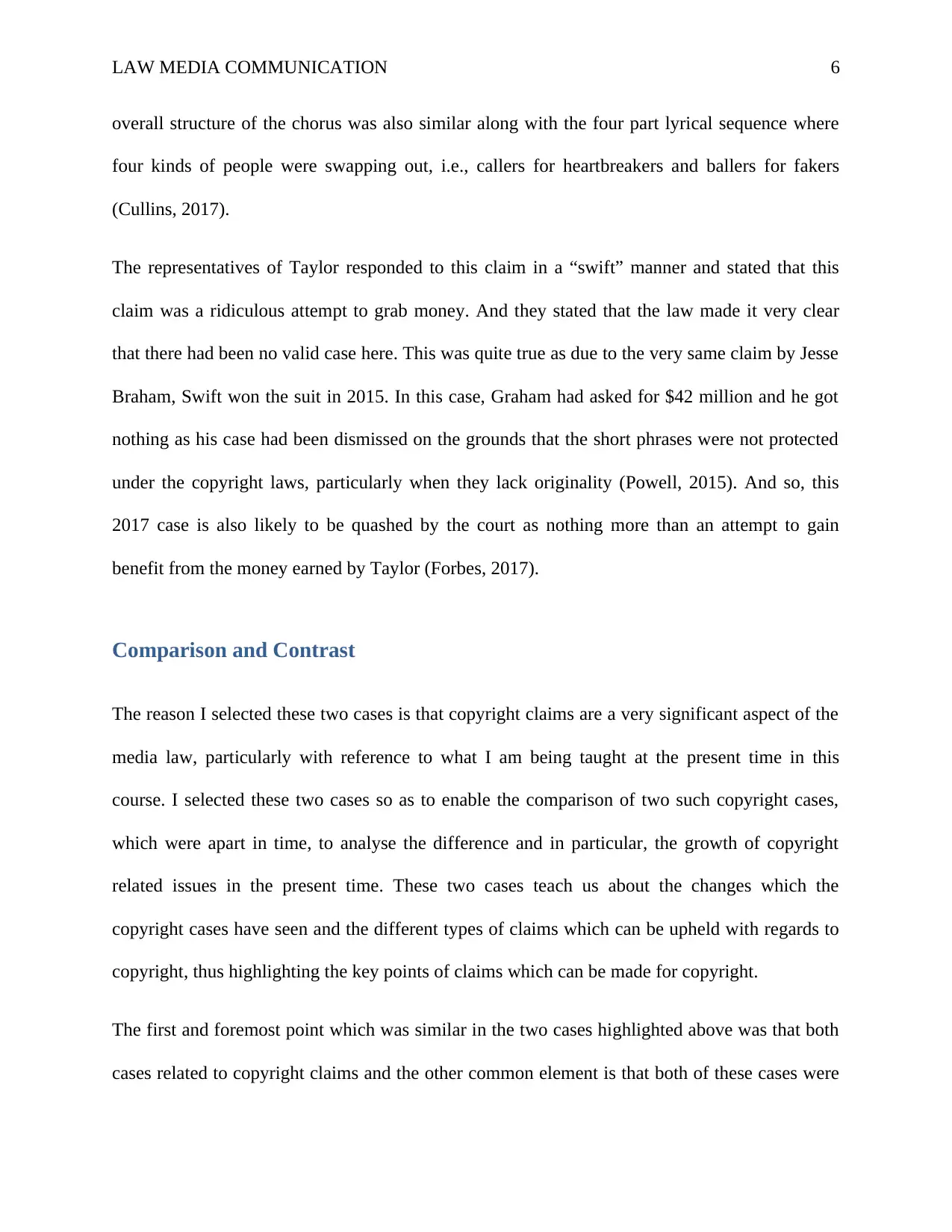
LAW MEDIA COMMUNICATION 6
overall structure of the chorus was also similar along with the four part lyrical sequence where
four kinds of people were swapping out, i.e., callers for heartbreakers and ballers for fakers
(Cullins, 2017).
The representatives of Taylor responded to this claim in a “swift” manner and stated that this
claim was a ridiculous attempt to grab money. And they stated that the law made it very clear
that there had been no valid case here. This was quite true as due to the very same claim by Jesse
Braham, Swift won the suit in 2015. In this case, Graham had asked for $42 million and he got
nothing as his case had been dismissed on the grounds that the short phrases were not protected
under the copyright laws, particularly when they lack originality (Powell, 2015). And so, this
2017 case is also likely to be quashed by the court as nothing more than an attempt to gain
benefit from the money earned by Taylor (Forbes, 2017).
Comparison and Contrast
The reason I selected these two cases is that copyright claims are a very significant aspect of the
media law, particularly with reference to what I am being taught at the present time in this
course. I selected these two cases so as to enable the comparison of two such copyright cases,
which were apart in time, to analyse the difference and in particular, the growth of copyright
related issues in the present time. These two cases teach us about the changes which the
copyright cases have seen and the different types of claims which can be upheld with regards to
copyright, thus highlighting the key points of claims which can be made for copyright.
The first and foremost point which was similar in the two cases highlighted above was that both
cases related to copyright claims and the other common element is that both of these cases were
overall structure of the chorus was also similar along with the four part lyrical sequence where
four kinds of people were swapping out, i.e., callers for heartbreakers and ballers for fakers
(Cullins, 2017).
The representatives of Taylor responded to this claim in a “swift” manner and stated that this
claim was a ridiculous attempt to grab money. And they stated that the law made it very clear
that there had been no valid case here. This was quite true as due to the very same claim by Jesse
Braham, Swift won the suit in 2015. In this case, Graham had asked for $42 million and he got
nothing as his case had been dismissed on the grounds that the short phrases were not protected
under the copyright laws, particularly when they lack originality (Powell, 2015). And so, this
2017 case is also likely to be quashed by the court as nothing more than an attempt to gain
benefit from the money earned by Taylor (Forbes, 2017).
Comparison and Contrast
The reason I selected these two cases is that copyright claims are a very significant aspect of the
media law, particularly with reference to what I am being taught at the present time in this
course. I selected these two cases so as to enable the comparison of two such copyright cases,
which were apart in time, to analyse the difference and in particular, the growth of copyright
related issues in the present time. These two cases teach us about the changes which the
copyright cases have seen and the different types of claims which can be upheld with regards to
copyright, thus highlighting the key points of claims which can be made for copyright.
The first and foremost point which was similar in the two cases highlighted above was that both
cases related to copyright claims and the other common element is that both of these cases were
⊘ This is a preview!⊘
Do you want full access?
Subscribe today to unlock all pages.

Trusted by 1+ million students worldwide
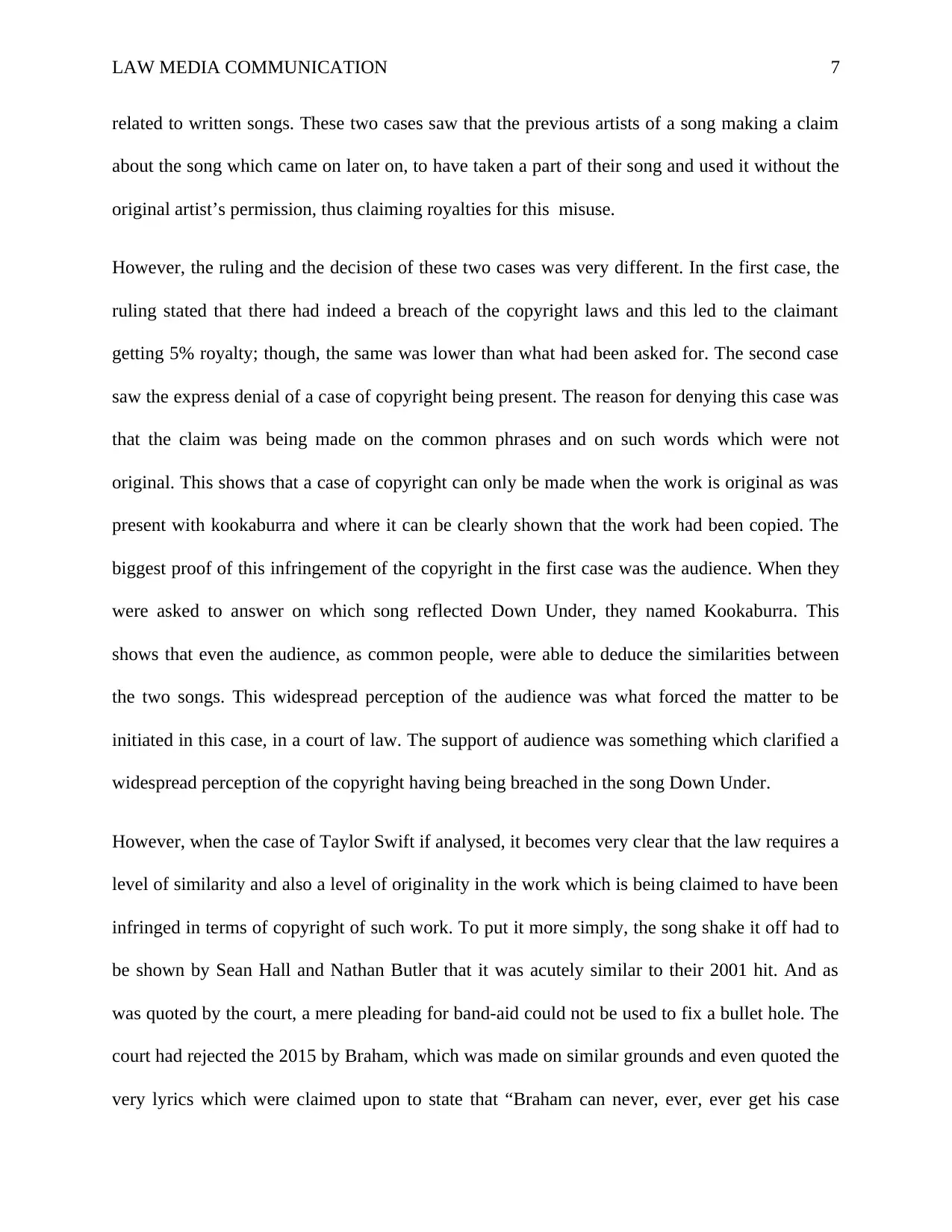
LAW MEDIA COMMUNICATION 7
related to written songs. These two cases saw that the previous artists of a song making a claim
about the song which came on later on, to have taken a part of their song and used it without the
original artist’s permission, thus claiming royalties for this misuse.
However, the ruling and the decision of these two cases was very different. In the first case, the
ruling stated that there had indeed a breach of the copyright laws and this led to the claimant
getting 5% royalty; though, the same was lower than what had been asked for. The second case
saw the express denial of a case of copyright being present. The reason for denying this case was
that the claim was being made on the common phrases and on such words which were not
original. This shows that a case of copyright can only be made when the work is original as was
present with kookaburra and where it can be clearly shown that the work had been copied. The
biggest proof of this infringement of the copyright in the first case was the audience. When they
were asked to answer on which song reflected Down Under, they named Kookaburra. This
shows that even the audience, as common people, were able to deduce the similarities between
the two songs. This widespread perception of the audience was what forced the matter to be
initiated in this case, in a court of law. The support of audience was something which clarified a
widespread perception of the copyright having being breached in the song Down Under.
However, when the case of Taylor Swift if analysed, it becomes very clear that the law requires a
level of similarity and also a level of originality in the work which is being claimed to have been
infringed in terms of copyright of such work. To put it more simply, the song shake it off had to
be shown by Sean Hall and Nathan Butler that it was acutely similar to their 2001 hit. And as
was quoted by the court, a mere pleading for band-aid could not be used to fix a bullet hole. The
court had rejected the 2015 by Braham, which was made on similar grounds and even quoted the
very lyrics which were claimed upon to state that “Braham can never, ever, ever get his case
related to written songs. These two cases saw that the previous artists of a song making a claim
about the song which came on later on, to have taken a part of their song and used it without the
original artist’s permission, thus claiming royalties for this misuse.
However, the ruling and the decision of these two cases was very different. In the first case, the
ruling stated that there had indeed a breach of the copyright laws and this led to the claimant
getting 5% royalty; though, the same was lower than what had been asked for. The second case
saw the express denial of a case of copyright being present. The reason for denying this case was
that the claim was being made on the common phrases and on such words which were not
original. This shows that a case of copyright can only be made when the work is original as was
present with kookaburra and where it can be clearly shown that the work had been copied. The
biggest proof of this infringement of the copyright in the first case was the audience. When they
were asked to answer on which song reflected Down Under, they named Kookaburra. This
shows that even the audience, as common people, were able to deduce the similarities between
the two songs. This widespread perception of the audience was what forced the matter to be
initiated in this case, in a court of law. The support of audience was something which clarified a
widespread perception of the copyright having being breached in the song Down Under.
However, when the case of Taylor Swift if analysed, it becomes very clear that the law requires a
level of similarity and also a level of originality in the work which is being claimed to have been
infringed in terms of copyright of such work. To put it more simply, the song shake it off had to
be shown by Sean Hall and Nathan Butler that it was acutely similar to their 2001 hit. And as
was quoted by the court, a mere pleading for band-aid could not be used to fix a bullet hole. The
court had rejected the 2015 by Braham, which was made on similar grounds and even quoted the
very lyrics which were claimed upon to state that “Braham can never, ever, ever get his case
Paraphrase This Document
Need a fresh take? Get an instant paraphrase of this document with our AI Paraphraser
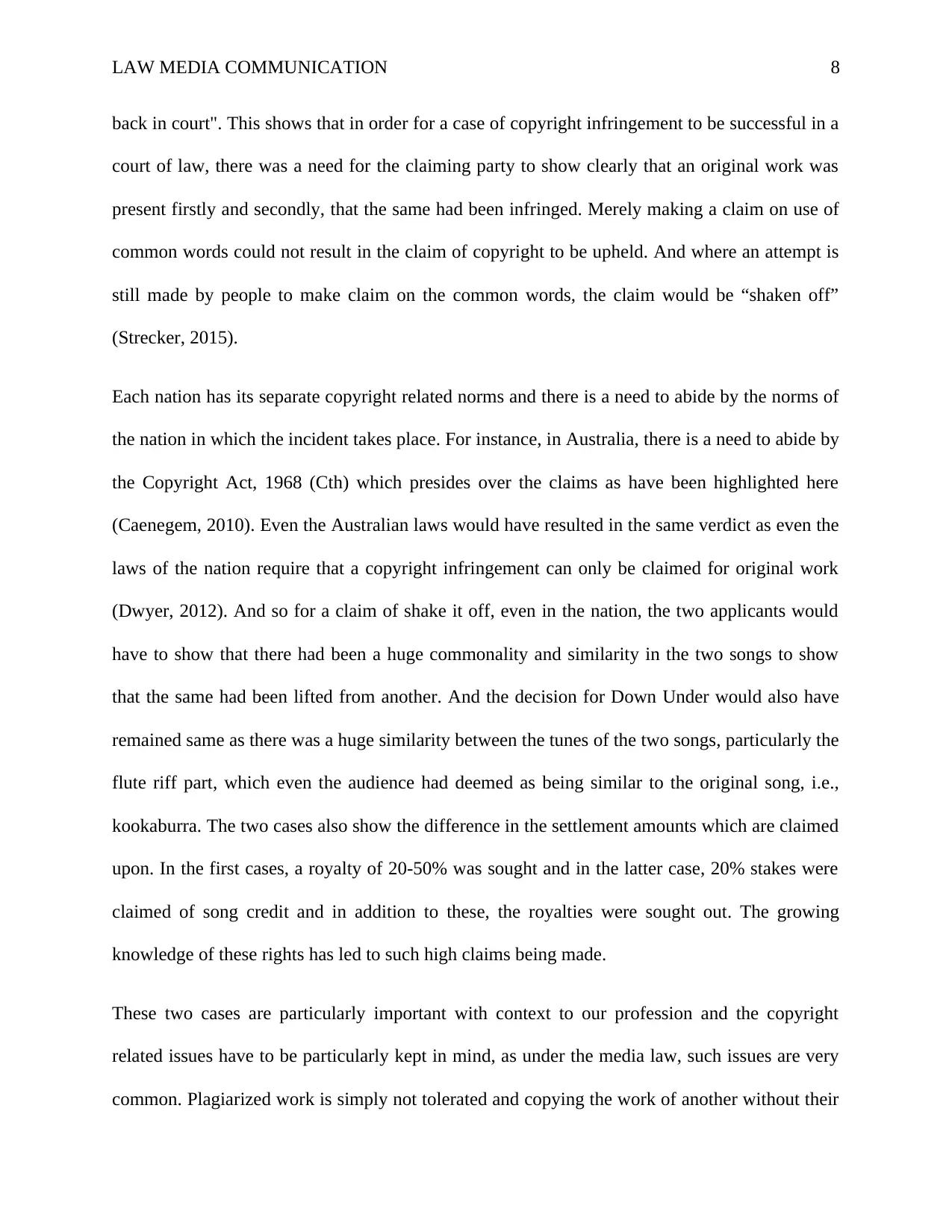
LAW MEDIA COMMUNICATION 8
back in court". This shows that in order for a case of copyright infringement to be successful in a
court of law, there was a need for the claiming party to show clearly that an original work was
present firstly and secondly, that the same had been infringed. Merely making a claim on use of
common words could not result in the claim of copyright to be upheld. And where an attempt is
still made by people to make claim on the common words, the claim would be “shaken off”
(Strecker, 2015).
Each nation has its separate copyright related norms and there is a need to abide by the norms of
the nation in which the incident takes place. For instance, in Australia, there is a need to abide by
the Copyright Act, 1968 (Cth) which presides over the claims as have been highlighted here
(Caenegem, 2010). Even the Australian laws would have resulted in the same verdict as even the
laws of the nation require that a copyright infringement can only be claimed for original work
(Dwyer, 2012). And so for a claim of shake it off, even in the nation, the two applicants would
have to show that there had been a huge commonality and similarity in the two songs to show
that the same had been lifted from another. And the decision for Down Under would also have
remained same as there was a huge similarity between the tunes of the two songs, particularly the
flute riff part, which even the audience had deemed as being similar to the original song, i.e.,
kookaburra. The two cases also show the difference in the settlement amounts which are claimed
upon. In the first cases, a royalty of 20-50% was sought and in the latter case, 20% stakes were
claimed of song credit and in addition to these, the royalties were sought out. The growing
knowledge of these rights has led to such high claims being made.
These two cases are particularly important with context to our profession and the copyright
related issues have to be particularly kept in mind, as under the media law, such issues are very
common. Plagiarized work is simply not tolerated and copying the work of another without their
back in court". This shows that in order for a case of copyright infringement to be successful in a
court of law, there was a need for the claiming party to show clearly that an original work was
present firstly and secondly, that the same had been infringed. Merely making a claim on use of
common words could not result in the claim of copyright to be upheld. And where an attempt is
still made by people to make claim on the common words, the claim would be “shaken off”
(Strecker, 2015).
Each nation has its separate copyright related norms and there is a need to abide by the norms of
the nation in which the incident takes place. For instance, in Australia, there is a need to abide by
the Copyright Act, 1968 (Cth) which presides over the claims as have been highlighted here
(Caenegem, 2010). Even the Australian laws would have resulted in the same verdict as even the
laws of the nation require that a copyright infringement can only be claimed for original work
(Dwyer, 2012). And so for a claim of shake it off, even in the nation, the two applicants would
have to show that there had been a huge commonality and similarity in the two songs to show
that the same had been lifted from another. And the decision for Down Under would also have
remained same as there was a huge similarity between the tunes of the two songs, particularly the
flute riff part, which even the audience had deemed as being similar to the original song, i.e.,
kookaburra. The two cases also show the difference in the settlement amounts which are claimed
upon. In the first cases, a royalty of 20-50% was sought and in the latter case, 20% stakes were
claimed of song credit and in addition to these, the royalties were sought out. The growing
knowledge of these rights has led to such high claims being made.
These two cases are particularly important with context to our profession and the copyright
related issues have to be particularly kept in mind, as under the media law, such issues are very
common. Plagiarized work is simply not tolerated and copying the work of another without their
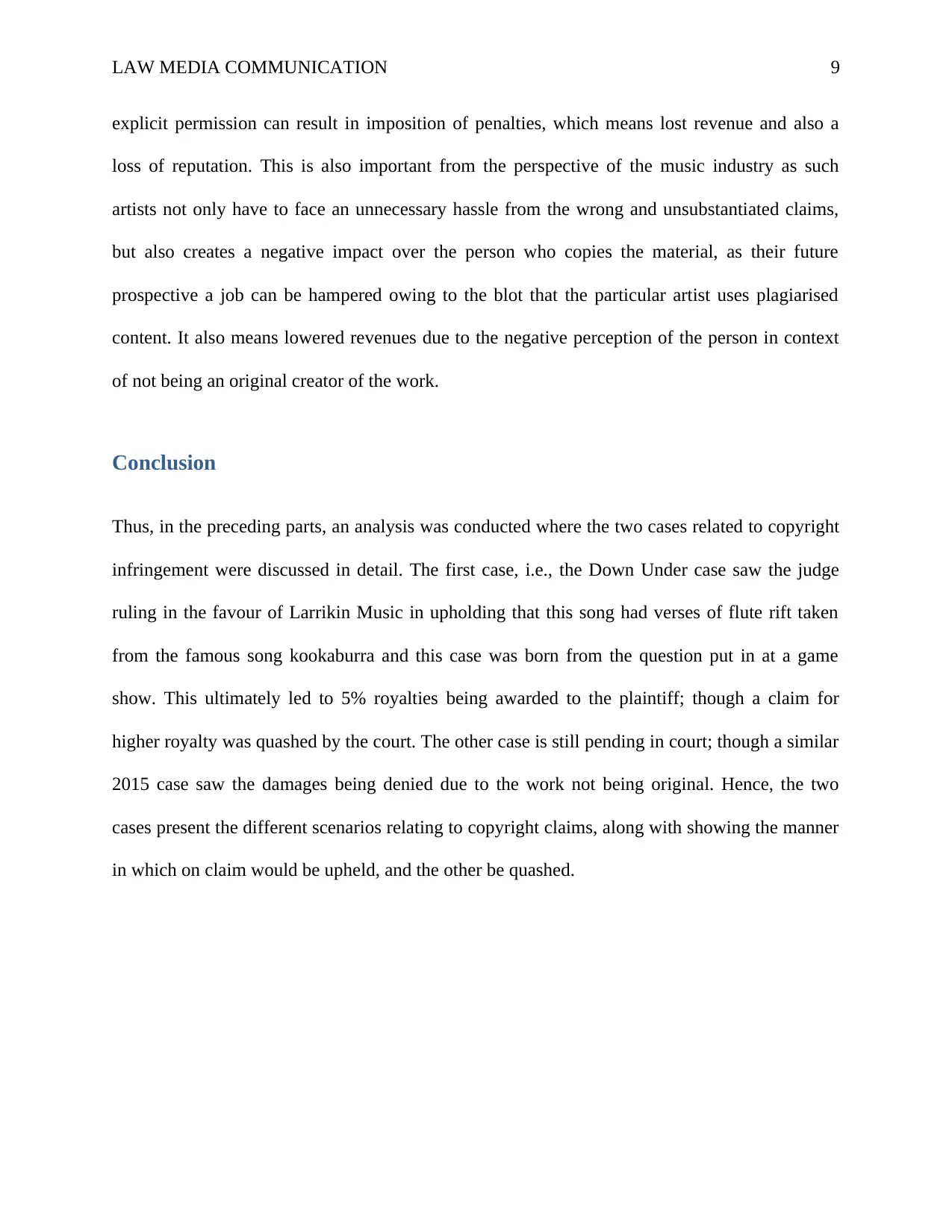
LAW MEDIA COMMUNICATION 9
explicit permission can result in imposition of penalties, which means lost revenue and also a
loss of reputation. This is also important from the perspective of the music industry as such
artists not only have to face an unnecessary hassle from the wrong and unsubstantiated claims,
but also creates a negative impact over the person who copies the material, as their future
prospective a job can be hampered owing to the blot that the particular artist uses plagiarised
content. It also means lowered revenues due to the negative perception of the person in context
of not being an original creator of the work.
Conclusion
Thus, in the preceding parts, an analysis was conducted where the two cases related to copyright
infringement were discussed in detail. The first case, i.e., the Down Under case saw the judge
ruling in the favour of Larrikin Music in upholding that this song had verses of flute rift taken
from the famous song kookaburra and this case was born from the question put in at a game
show. This ultimately led to 5% royalties being awarded to the plaintiff; though a claim for
higher royalty was quashed by the court. The other case is still pending in court; though a similar
2015 case saw the damages being denied due to the work not being original. Hence, the two
cases present the different scenarios relating to copyright claims, along with showing the manner
in which on claim would be upheld, and the other be quashed.
explicit permission can result in imposition of penalties, which means lost revenue and also a
loss of reputation. This is also important from the perspective of the music industry as such
artists not only have to face an unnecessary hassle from the wrong and unsubstantiated claims,
but also creates a negative impact over the person who copies the material, as their future
prospective a job can be hampered owing to the blot that the particular artist uses plagiarised
content. It also means lowered revenues due to the negative perception of the person in context
of not being an original creator of the work.
Conclusion
Thus, in the preceding parts, an analysis was conducted where the two cases related to copyright
infringement were discussed in detail. The first case, i.e., the Down Under case saw the judge
ruling in the favour of Larrikin Music in upholding that this song had verses of flute rift taken
from the famous song kookaburra and this case was born from the question put in at a game
show. This ultimately led to 5% royalties being awarded to the plaintiff; though a claim for
higher royalty was quashed by the court. The other case is still pending in court; though a similar
2015 case saw the damages being denied due to the work not being original. Hence, the two
cases present the different scenarios relating to copyright claims, along with showing the manner
in which on claim would be upheld, and the other be quashed.
⊘ This is a preview!⊘
Do you want full access?
Subscribe today to unlock all pages.

Trusted by 1+ million students worldwide
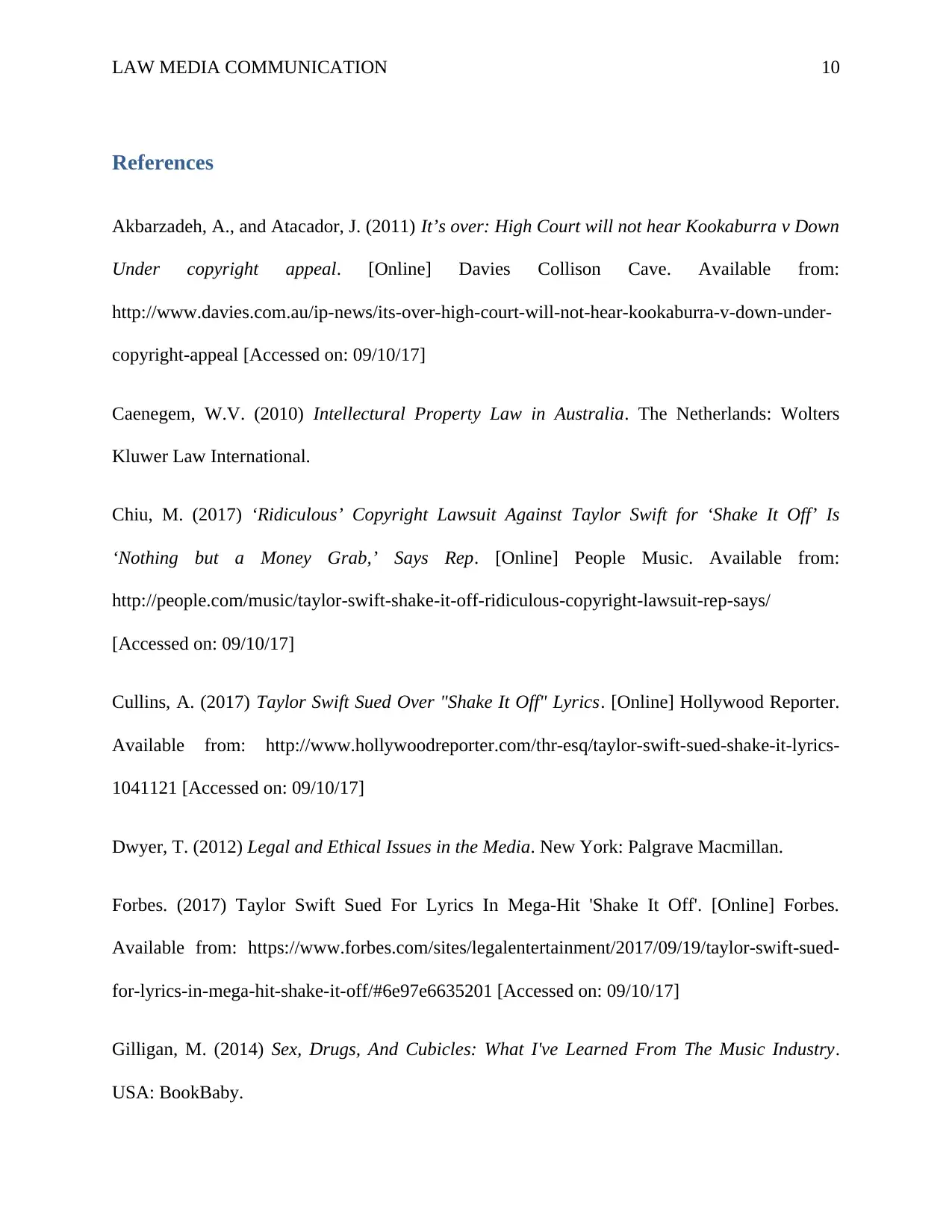
LAW MEDIA COMMUNICATION 10
References
Akbarzadeh, A., and Atacador, J. (2011) It’s over: High Court will not hear Kookaburra v Down
Under copyright appeal. [Online] Davies Collison Cave. Available from:
http://www.davies.com.au/ip-news/its-over-high-court-will-not-hear-kookaburra-v-down-under-
copyright-appeal [Accessed on: 09/10/17]
Caenegem, W.V. (2010) Intellectural Property Law in Australia. The Netherlands: Wolters
Kluwer Law International.
Chiu, M. (2017) ‘Ridiculous’ Copyright Lawsuit Against Taylor Swift for ‘Shake It Off’ Is
‘Nothing but a Money Grab,’ Says Rep. [Online] People Music. Available from:
http://people.com/music/taylor-swift-shake-it-off-ridiculous-copyright-lawsuit-rep-says/
[Accessed on: 09/10/17]
Cullins, A. (2017) Taylor Swift Sued Over "Shake It Off" Lyrics. [Online] Hollywood Reporter.
Available from: http://www.hollywoodreporter.com/thr-esq/taylor-swift-sued-shake-it-lyrics-
1041121 [Accessed on: 09/10/17]
Dwyer, T. (2012) Legal and Ethical Issues in the Media. New York: Palgrave Macmillan.
Forbes. (2017) Taylor Swift Sued For Lyrics In Mega-Hit 'Shake It Off'. [Online] Forbes.
Available from: https://www.forbes.com/sites/legalentertainment/2017/09/19/taylor-swift-sued-
for-lyrics-in-mega-hit-shake-it-off/#6e97e6635201 [Accessed on: 09/10/17]
Gilligan, M. (2014) Sex, Drugs, And Cubicles: What I've Learned From The Music Industry.
USA: BookBaby.
References
Akbarzadeh, A., and Atacador, J. (2011) It’s over: High Court will not hear Kookaburra v Down
Under copyright appeal. [Online] Davies Collison Cave. Available from:
http://www.davies.com.au/ip-news/its-over-high-court-will-not-hear-kookaburra-v-down-under-
copyright-appeal [Accessed on: 09/10/17]
Caenegem, W.V. (2010) Intellectural Property Law in Australia. The Netherlands: Wolters
Kluwer Law International.
Chiu, M. (2017) ‘Ridiculous’ Copyright Lawsuit Against Taylor Swift for ‘Shake It Off’ Is
‘Nothing but a Money Grab,’ Says Rep. [Online] People Music. Available from:
http://people.com/music/taylor-swift-shake-it-off-ridiculous-copyright-lawsuit-rep-says/
[Accessed on: 09/10/17]
Cullins, A. (2017) Taylor Swift Sued Over "Shake It Off" Lyrics. [Online] Hollywood Reporter.
Available from: http://www.hollywoodreporter.com/thr-esq/taylor-swift-sued-shake-it-lyrics-
1041121 [Accessed on: 09/10/17]
Dwyer, T. (2012) Legal and Ethical Issues in the Media. New York: Palgrave Macmillan.
Forbes. (2017) Taylor Swift Sued For Lyrics In Mega-Hit 'Shake It Off'. [Online] Forbes.
Available from: https://www.forbes.com/sites/legalentertainment/2017/09/19/taylor-swift-sued-
for-lyrics-in-mega-hit-shake-it-off/#6e97e6635201 [Accessed on: 09/10/17]
Gilligan, M. (2014) Sex, Drugs, And Cubicles: What I've Learned From The Music Industry.
USA: BookBaby.
Paraphrase This Document
Need a fresh take? Get an instant paraphrase of this document with our AI Paraphraser
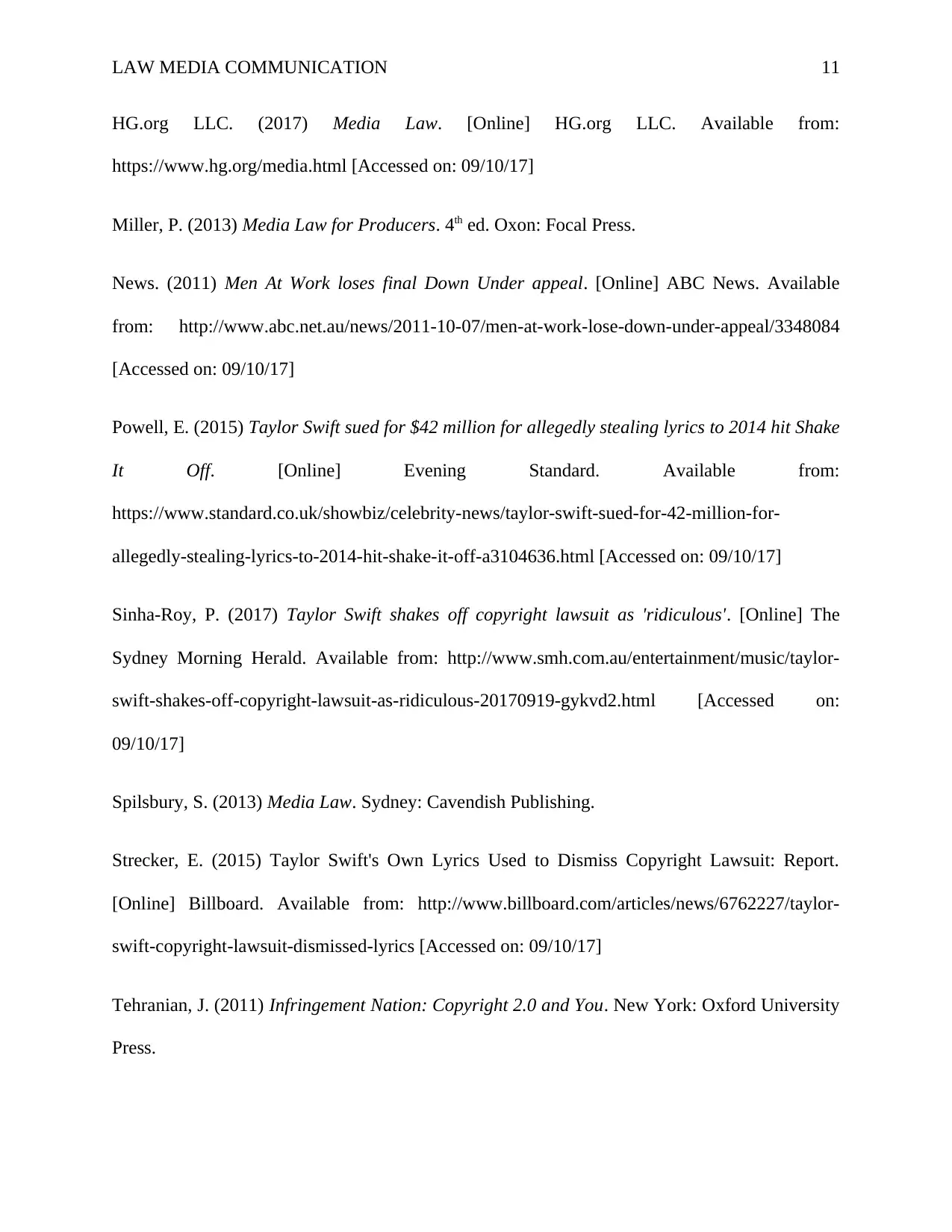
LAW MEDIA COMMUNICATION 11
HG.org LLC. (2017) Media Law. [Online] HG.org LLC. Available from:
https://www.hg.org/media.html [Accessed on: 09/10/17]
Miller, P. (2013) Media Law for Producers. 4th ed. Oxon: Focal Press.
News. (2011) Men At Work loses final Down Under appeal. [Online] ABC News. Available
from: http://www.abc.net.au/news/2011-10-07/men-at-work-lose-down-under-appeal/3348084
[Accessed on: 09/10/17]
Powell, E. (2015) Taylor Swift sued for $42 million for allegedly stealing lyrics to 2014 hit Shake
It Off. [Online] Evening Standard. Available from:
https://www.standard.co.uk/showbiz/celebrity-news/taylor-swift-sued-for-42-million-for-
allegedly-stealing-lyrics-to-2014-hit-shake-it-off-a3104636.html [Accessed on: 09/10/17]
Sinha-Roy, P. (2017) Taylor Swift shakes off copyright lawsuit as 'ridiculous'. [Online] The
Sydney Morning Herald. Available from: http://www.smh.com.au/entertainment/music/taylor-
swift-shakes-off-copyright-lawsuit-as-ridiculous-20170919-gykvd2.html [Accessed on:
09/10/17]
Spilsbury, S. (2013) Media Law. Sydney: Cavendish Publishing.
Strecker, E. (2015) Taylor Swift's Own Lyrics Used to Dismiss Copyright Lawsuit: Report.
[Online] Billboard. Available from: http://www.billboard.com/articles/news/6762227/taylor-
swift-copyright-lawsuit-dismissed-lyrics [Accessed on: 09/10/17]
Tehranian, J. (2011) Infringement Nation: Copyright 2.0 and You. New York: Oxford University
Press.
HG.org LLC. (2017) Media Law. [Online] HG.org LLC. Available from:
https://www.hg.org/media.html [Accessed on: 09/10/17]
Miller, P. (2013) Media Law for Producers. 4th ed. Oxon: Focal Press.
News. (2011) Men At Work loses final Down Under appeal. [Online] ABC News. Available
from: http://www.abc.net.au/news/2011-10-07/men-at-work-lose-down-under-appeal/3348084
[Accessed on: 09/10/17]
Powell, E. (2015) Taylor Swift sued for $42 million for allegedly stealing lyrics to 2014 hit Shake
It Off. [Online] Evening Standard. Available from:
https://www.standard.co.uk/showbiz/celebrity-news/taylor-swift-sued-for-42-million-for-
allegedly-stealing-lyrics-to-2014-hit-shake-it-off-a3104636.html [Accessed on: 09/10/17]
Sinha-Roy, P. (2017) Taylor Swift shakes off copyright lawsuit as 'ridiculous'. [Online] The
Sydney Morning Herald. Available from: http://www.smh.com.au/entertainment/music/taylor-
swift-shakes-off-copyright-lawsuit-as-ridiculous-20170919-gykvd2.html [Accessed on:
09/10/17]
Spilsbury, S. (2013) Media Law. Sydney: Cavendish Publishing.
Strecker, E. (2015) Taylor Swift's Own Lyrics Used to Dismiss Copyright Lawsuit: Report.
[Online] Billboard. Available from: http://www.billboard.com/articles/news/6762227/taylor-
swift-copyright-lawsuit-dismissed-lyrics [Accessed on: 09/10/17]
Tehranian, J. (2011) Infringement Nation: Copyright 2.0 and You. New York: Oxford University
Press.
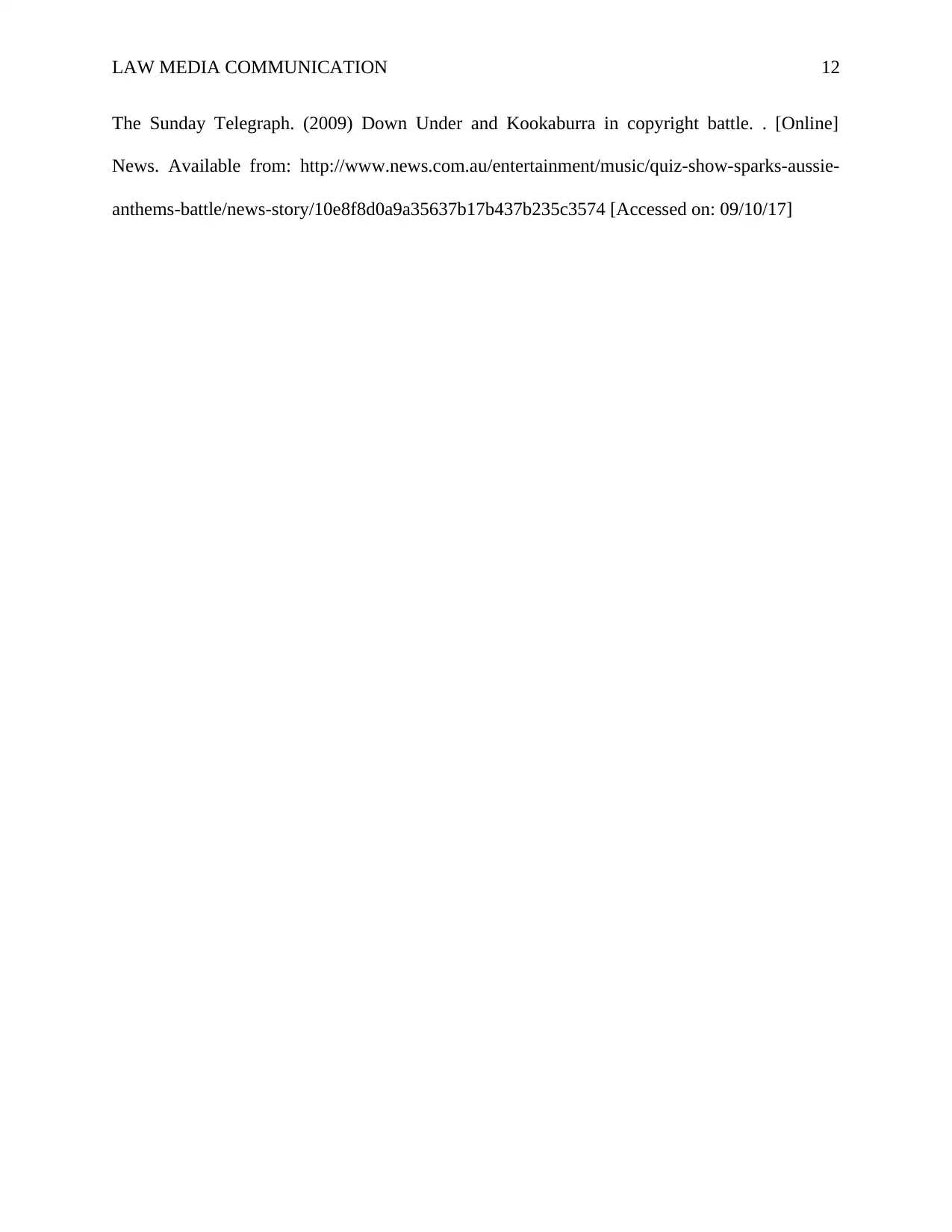
LAW MEDIA COMMUNICATION 12
The Sunday Telegraph. (2009) Down Under and Kookaburra in copyright battle. . [Online]
News. Available from: http://www.news.com.au/entertainment/music/quiz-show-sparks-aussie-
anthems-battle/news-story/10e8f8d0a9a35637b17b437b235c3574 [Accessed on: 09/10/17]
The Sunday Telegraph. (2009) Down Under and Kookaburra in copyright battle. . [Online]
News. Available from: http://www.news.com.au/entertainment/music/quiz-show-sparks-aussie-
anthems-battle/news-story/10e8f8d0a9a35637b17b437b235c3574 [Accessed on: 09/10/17]
⊘ This is a preview!⊘
Do you want full access?
Subscribe today to unlock all pages.

Trusted by 1+ million students worldwide
1 out of 12
Your All-in-One AI-Powered Toolkit for Academic Success.
+13062052269
info@desklib.com
Available 24*7 on WhatsApp / Email
![[object Object]](/_next/static/media/star-bottom.7253800d.svg)
Unlock your academic potential
Copyright © 2020–2026 A2Z Services. All Rights Reserved. Developed and managed by ZUCOL.
